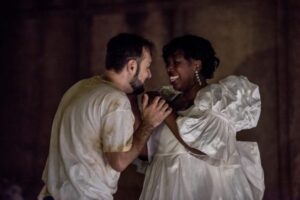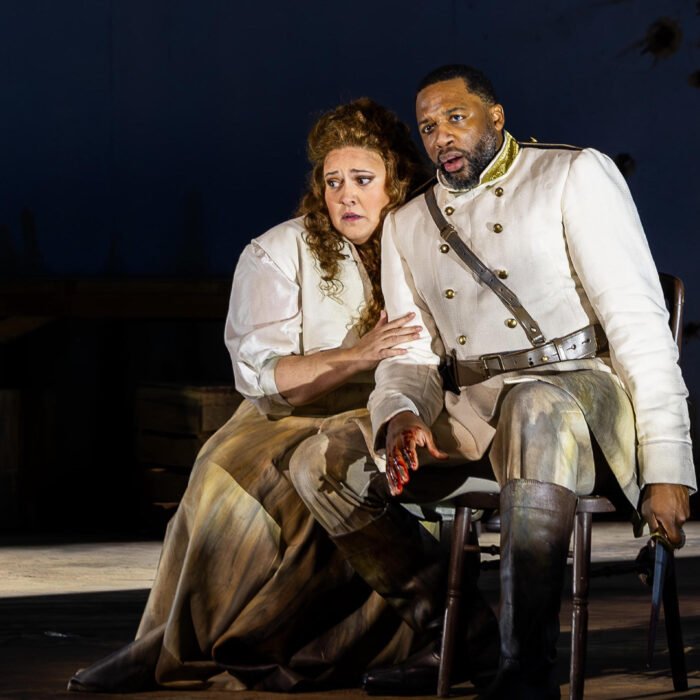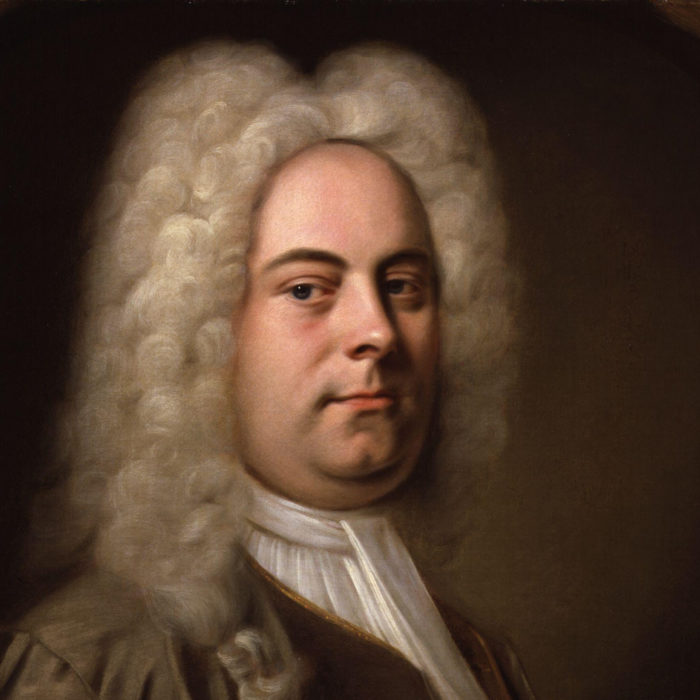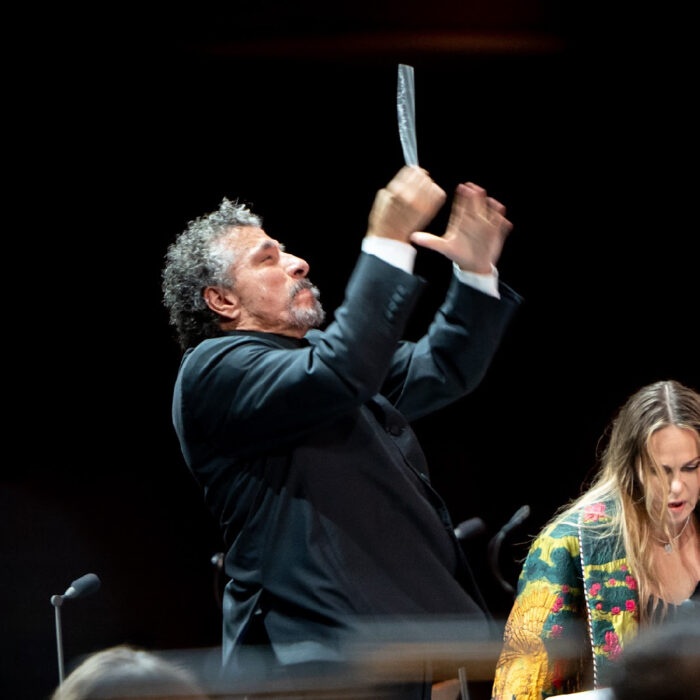
Buxton International Festival 2024 Review: Ernani
Adrian Kelly’s Musical Direction Overcomes an Unconvincing Staging
By Alan Neilson(Photo: Genevieve Girling)
Set in early 14th century Spain, “Ernani” is a simple tale of three men competing for the love of the same woman, in which the society’s values and codes of chivalry dictate the course of the narrative. Providing that one accepts the context uncritically, it can be a gripping, quick-moving drama that rattles along with plenty of rousing and emotionally strong melodies. Think too deeply about the behavior and motivations of the characters, then it can all appear somewhat ridiculous.
Ernani, under threat of death from his rival, the Marquis de Silva, swears an oath to kill himself, provided that he is first allowed to exact revenge on their mutual rival, King Carlo. Silva needs only blow his horn, and Ernani will immediately end his own life. The dreaded day arrives. Ernani has been forgiven by the King and can now marry his beloved Elvira, at which point de Silva shows up and blows his horn. Ernani complies and kills himself. Within the context of knights, heroic deeds, strict hierarchy, deference and chivalry, it is a story that can be accepted, even if one harbors a number of reservations.
An Unconvincing, Lackluster Staging
The director for this production by the Buxton International Festival, Jamie Manton, however, decided to move the drama to the present day and thereby remove the drivers behind the narrative. The behavior of the characters at best seemed simply bizarre. Their motivations simply do not ring true. Would anyone today really expect someone to feel morally beholden to keep their word in such a situation, let alone be believed in the first place? Everything that propels the story forward relies on power structures that no longer exist outside criminal networks, and even then, such organizations are unlikely to rely naively on trust or horns. Maybe if Manton had set the story within a criminal context, his staging might have been more convincing, but there was no evidence of this. Equally damaging, however, was that it was never clear exactly what a contemporary environment was supposed to add to our understanding.
The designer, Sami Fendall, created a stage that looked like the inside of a wooden barn with a fluorescent light across the back. There were doors along either side to allow easy access and exits for the characters, and apart from a few flowers that appeared in Act two and the tomb in Act three, there was little else of note. Her costume designs were modern but low-profile and struggled to capture the attention. It was all too dull and uninspiring and did nothing to promote the drama.
There were, however, a couple of positives to the staging. Manton was successful in bringing out convincing acting performances from the singers; they interacted well, portrayed their emotional positions clearly, and created strongly defined characters. His treatment of Elvira, in particular, was very effective; he explored and highlighted her position as a victim, carefully linking it to her lack of agency in her dealings with men. Her suffering at the hands of de Silva and of Carlo was clearly depicted, but even Ernani, who loved her deeply, was seen to be the one making all the decisions; Elvira had no power over the outcomes, which was excellently illustrated at the end of Act four in which a low-hanging circular fluorescent light was used to cast a circular shadow onto the middle of the stage in which Elvira appeared trapped. It was a well-crafted metaphor that presented her situation brilliantly; unfortunately, such moments were all too rare.
Kelly’s Musical Direction Compensates for the Insipid Staging
The conductor, Adrian Kelly, elicited a warm, dramatically strong performance from the orchestra, which caught the emotional intensity of the score, moving convincingly between dark, threatening passages and lighter, breezier sections. He maintained a pleasing pace and successfully promoted the melody. If there was a negative criticism, it was that on occasions, especially in Acts one and two, he allowed the singers to dominate the orchestra, impacting the overall balance. The balance within the orchestra itself, however, was nicely managed to bring out the textural qualities of the music.
Tenor Roman Arndt in the role of Ernani gave a full throttled performance that was high on emotion, but low on subtlety. His Ernani was more than happy to wear his heart on his sleeve; he was quick to pour out his feelings of love, anger, jealousy and hurt towards Elvira or anyone else with whom he came into contact. There was little in the way of reflection or conflicted emotions; everything was full-on! From his opening aria, “Come rugiada al cespite,” in which he voices his feelings for Elvira, he allowed his unfiltered passions to seize control. It was, however, all too one-paced.
Baritone André Heyboer was an authoritative, sometimes regal Don Carlo who allowed the man behind the crown to reveal himself. It was a layered portrayal in which he adapted his character to the changing situations in which he found himself. He could be aggressive and vicious when he felt his ambitions were threatened, but he was happy to embrace a more conciliatory approach when he became the emperor and could see himself in a different light. His Act two aria “Lo vedremo, veglio audace” was beautifully sung, capturing the melody and the king’s controlled anger perfectly, and proved to be one of the musical high points of the evening.
Bass Alastair Miles brilliantly played the role of Don Ruy Gomez de Silva as a man used to exercising raw power, unchecked by a moral conscience. He confidently abused those around him, including Elvira, whom he was supposed to protect. Vicious and demanding, his behavior was unscrupulously fashioned to further his own designs. He was a thoroughly dislikable character, yet Miles never overplayed the part. His character never fell into a cliché and was always wholly believable. His singing was a cut above the other singers; he was able to introduce a greater degree of subtlety by moulding his intonation to fit the text and highlighting significant words to intensify the dramatic impact, which he showed off wonderfully in his aria “Infelice! E tu credevi.” Likewise, his recitatives were brilliantly rendered.
Soprano Nadine Benjamin produced a very human portrait of Elvira, in which she not only convinced as a woman in love but also captured the pain of being bullied and emotionally abused by two powerful men. She possesses a resonant, flexible and secure voice with an attractive timbre, which she employed energetically to craft an emotionally expressive and sympathetic reading, pushing the voice to its limits with emotional inflections and dynamic contrasts that successfully left no doubt about her feelings for the men who surrounded her. Her reliance on and love for Ernani were immediately made clear in her opening aria, “Ernani, involami” as she allowed her fears and love to collide as she imbued the voice with a mixture of anxiety and hope. Her feelings of contempt for Carlo were quickly made apparent in their Act one, scene two clash, while her relationship with de Silva was subtly developed to take into account their complex ties.
“Ernani” is an opera with plenty of pleasing ensemble pieces, and they proved to be one of the strengths of the production. The voices of the singers were nicely matched with each other. Arndt’s resonant, impassioned singing blended beautifully with Benjamin’s emotional, expressive presentation, which brought their interactions thrillingly alive, particularly in Acts two and four. Likewise, Benjamin’s duets with Hoyboer and with Miles were lively affairs, in which their very different, attractive tonal qualities added to the presentation. The scena and finales were energetic and electric affairs as the singers combined and sparked off each other to bring out the full dramatic aspect of the music.
Although Don Riccardo is only a small role, baritone Emyr Lloyd Jones made a very strong impression with a youthful, energetic and confident performance
Baritone Theo Perry and soprano Jane Burrell both produced solid performances in the relatively small roles of Jago and Giovanna.
The chorus was in excellent form and played no small part in fleshing out the scenes in which they appeared. Whether as the bandits in Act one, scene one in which the male chorus enthusiastically attacked the line with gusto, or as the female attendants who sympathetically supported Elvira in scene two, the members performed their roles enthusiastically and to a high quality.
It was a production that was simultaneously disappointing and very satisfying. One left the theatre impressed by its musical quality but uninspired by the staging. Moving the drama to the present day meant the historical color was lost, yet insufficient attention was paid to how to compensate for that loss, so that it never caught the attention on a visual level. Also the incongruities thrown up by setting it in the present day were never resolved.



